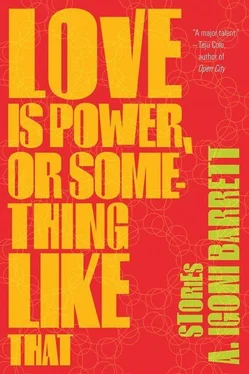A phalanx of neighbors bore Daoju Anabraba into the house. Another group of neighbors gathered round the hunkered down form of Dimié Abrakasa. Méneia knelt beside him, her shoulders shaking with sobs. Benaebi, awestruck at the ferocity of his mother’s attack, was standing behind his brother, his hands clasped in his armpits. Mama Malachi, whose apartment was two doors down from theirs, touched Dimié Abrakasa’s shoulder. “You have done something very bad to make your ma react like so,” she said. Then she bent down, held his arms, pulled them away from his head. Someone switched on a torch and turned the light on him. His eyes were hare-caught-in-the-headlights bright. There was a speckle of blood on his lips and four flesh-white scratches on one side of his neck. As if in reaction to the light, blood welled from the wounds. Méneia caught her breath. Mama Malachi released his arms. They fell into his lap.
The neighbors drew to one side and consulted. A few words, repeated often, reached the children’s hearing: words like mother and landlord and drink . Then Mr. Mogaji of apartment one — the first door on the right — approached them.
“Do you kids have somewhere you can spend the night?”
Méneia blew her nose. Dimié Abrakasa did not stir.
Mama Malachi shouted across to them. “Talk! Do you?”
Méneia coughed to clear her throat. “My granma’s,” she said.
“Go there with your brother tonight,” Mr. Mogaji said. His torchlight played on Méneia’s face. “Don’t cry again, Méne, clean your eyes. We’ll talk to your mother in the morning. I have some spirit and cotton wool. Come and take, so you can clean Dima’s wound.”
.9 .
Granma Anabraba’s house was in a part of town notorious for its youth gangs. It used to be a good neighborhood, and the architecture was a relic of safer times — the simple, cottagelike houses, wide frontages, and alleys that opened onto bordering streets. With fear had come a stack-up of security devices. Now, house doors and windows were reinforced with metal, front yards were walled and gated, and alley ends blocked off with piled debris.
When the Abrakasa children arrived at their grandmother’s house, they had to rattle the gate for several minutes before a frail, frightened voice demanded: “What do you want?”
Méneia answered. “It’s us, Granma.”
“Méneia?”
“Yes, Granma.”
“Dimié?”
“Granma.”
“Benaebi?”
“Granma?”
“What are you children doing out so late? It’s not safe! Wait, I’m coming.”
The rattle of metal, then the front door creaked open to reveal a dark, empty entrance.
“ Psst!”
“Granma?”
Their grandmother’s voice floated across to them. “Dimié, look around and check if there’s anyone near you.”
The children peered up and down the street. “There’s nobody, Granma,” Dimié Abrakasa said.
“Make sure,” her voice insisted.
Dimié Abrakasa stepped back and scanned the area. The street was deserted.
“I’m sure, Granma. No one is here.”
Granma Anabraba appeared in the doorway. She paused there a moment, as if tasting the air, then she descended the short flight of steps and crossed the distance to the gate in a canter. “I’m coming, I’m coming,” she whispered as she unlocked the gate, held it open for the children to enter, then clanged it shut and locked it. “Let’s go inside, it’s not safe out here,” she said, herding them toward the doorway with raised, crucifixed arms.
After the door was bolted, Granma Anabraba bent down to increase the dying flame of the hurricane lamp that sat in the chair beside the door. She straightened up with a low groan, turned to face the children, and voiced the terror that had gripped her since she identified the noise at her gate as nothing less extraordinary than a visit from her grandchildren. “What has happened to your mother?” she asked, peering into Dimié Abrakasa’s face. In the weak light cast by the lamp, she did not notice the scratches on his neck.
“Nothing, Granma,” Dimié Abrakasa said. “It’s just that we haven’t eaten anything today and there’s no food in the house. You know our Ben when he’s hungry, he won’t let anybody rest.”
Granma Anabraba released her breath. “I was afraid!” she exclaimed. She reached out to draw her grandson to her breast, clung to him. “It’s been so long since I saw you. You’re too skinny, Dimié. Why don’t you children visit me?”
Benaebi started to explain, “Mma said we shouldn’t—” but Méneia cut him off. “Shut up, Benaebi.”
With a bitter laugh, Granma Anabraba said, “Leave him alone. He’s not saying anything I don’t already know.” She released Dimié Abrakasa and took Benaebi’s arm. “Come, my child, let me feed you.”

When Granma Anabraba called from the kitchen for the children to collect their food, Benaebi jumped up from sleep and dashed down the unlit corridor. Méneia, before following, asked Dimié Abrakasa to let her bring him his food. He dropped back into his seat in answer. As his sister’s footsteps faded, the gloom of the room washed over him, lapping against his wounds like seawater. He thought of his mother, alone in the house. She, too, hadn’t eaten all day, hadn’t gotten her drink, and she’d had to endure the landlord’s insults. At the thought of the landlord, Dimié Abrakasa moaned. The patter of footsteps broke his reverie.
Granma Anabraba placed the hurricane lamp on the center table and settled into the seat across from Dimié Abrakasa. Benaebi, ignoring his grandmother’s warning that he wait for the meal to cool, was already halfway through the food on his plate before his back had even touched his seat. It was yam pottage, one of his favorites, and it gave off billows of fragrant steam that made him pant and blow at every mouthful. Méneia handed Dimié Abrakasa his plate and sat down beside him. The scrape of cutlery filled the air.
Granma Anabraba noticed that her eldest grandchild was picking at his food. She asked, “What’s wrong, Dimié?”
“Nothing,” he said.
“But you’re not eating.”
“I’m not really that hungry.”
Benaebi belched, stood up, placed his plate on the table, took a long drink of water, and flopped back into his chair. “More?” Granma Anabraba asked, but he replied, “I want to burst.” He slapped his belly and groaned. His thumb — under the pretense of wiping the oil from his lips, then with a show of picking his teeth — crept into his mouth.
When Méneia finished, she collected the plates, including her older brother’s, which he held out to her with a shake of his head when she made to bypass it. She headed for the kitchen, taking the light with her. In the darkness, Benaebi fell asleep. His breathing beat the air.
“Tomorrow is a school day,” Granma Anabraba said. She enunciated each word as if she were talking to herself; then her voice shook itself awake. “You children have to rise extra early so you can get home before going to school. Méneia will sleep with me. You boys can sleep in your mother’s old room.”
Dimié Abrakasa stirred. “Granma?”
“Yes, Dimié?”
“I’m not sleeping here tonight. I’m going home.”
“No way!” Granma Anabraba cried, jerking forward.
“I have to go,” Dimié Abrakasa said. “Mma hasn’t eaten all day. I have to take food to her. She’s not feeling well.”
“But it’s past eleven, it’s too late to go outside. No, no!”
“Mma hasn’t eaten all day. And she’s not well.”
His tone ended the matter. Granma Anabraba hung her head. “But it’s late. And the distance—” Dimié Abrakasa cut her off. “If you give me money for okada I’ll reach home in twenty minutes.”
Читать дальше


![Сьюзан Кейн - Quiet [The Power of Introverts in a World That Can't Stop Talking]](/books/33084/syuzan-kejn-quiet-the-power-of-introverts-in-a-wo-thumb.webp)










